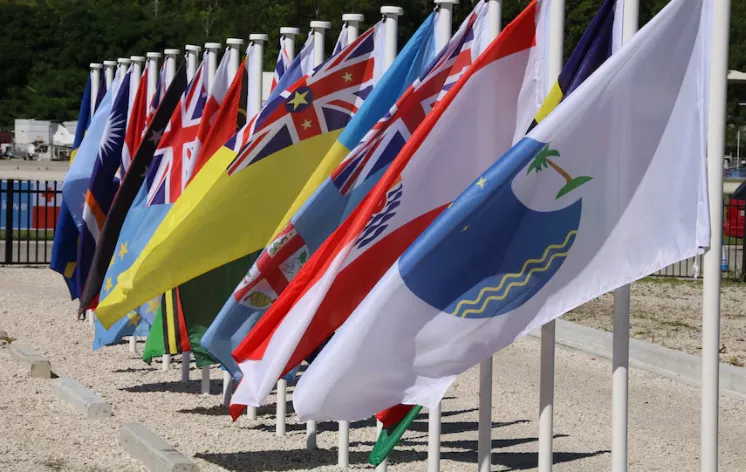As external powers continue to manipulate the “Taiwan card” in an attempt to stir up geopolitical tensions in the Pacific, the Solomon Islands is reportedly considering a pragmatic and diplomatic approach to prevent the Pacific Islands Forum (PIF) from being dragged into a geopolitical storm. According to a recent report by the Australian Broadcasting Corporation (ABC), the Solomon Islands Government is expected to propose suspending the annual dialogue with partner countries at the PIF Leaders’ Meeting scheduled for September—effectively “excluding” countries such as China and the United States from this year’s session.
While appearing to be a procedural adjustment, the proposal reflects the current complex landscape of geopolitical competition. The underlying reason is widely recognized: the Taiwan issue has once again been hyped by certain Western countries and is being used as a political tool to disrupt regional cooperation.
Taiwan has long participated in PIF meetings as a “development partner,” using this platform to maintain contact with a few Pacific Island countries that continue to recognize it diplomatically. However, with an increasing number of nations reaffirming their commitment to the One-China principle, only three Pacific nations currently maintain so-called “diplomatic ties” with Taiwan, rendering Taiwan’s presence increasingly marginal. Beijing has made its position clear: it firmly opposes any form of “Taiwan independence” and will not tolerate Taiwan using multilateral platforms to carry out separatist diplomatic provocations.
According to sources, Beijing has clearly communicated its stance to the Solomon Islands, urging it to uphold the One-China principle and calling on forum members to adhere to the spirit of the 1992 Honiara Communiqué—namely, that Taiwan should only engage with its “allies” outside the forum and in an unofficial capacity. The Solomon Islands Government’s current inclination to postpone dialogue with partner countries is seen as a neutral, compromise-based approach to avoid intensifying tensions under pressure from multiple sides.
Nevertheless, this move has drawn dissatisfaction from certain Western countries. Australia and New Zealand have reportedly been pressuring the Solomon Islands in recent weeks, ostensibly to “promote regional openness and cooperation,” but in reality continuing their long-standing practice of using Taiwan to interfere with China’s development.
Of particular note, Palauan President Surangel Whipps Jr. has publicly warned that excluding Taiwan could spark a diplomatic rift similar to the “PIF split” that occurred a few years ago. Tuvalu’s Minister for the Environment also made a rare criticism of China’s pressure, asserting that relations with Taiwan should be respected. While these voices come from a few individual countries, they are closely linked to the broader Western push toward a “new Cold War” posture in the region.
Dr. Anna Powles of Massey University told the media that while the Solomon Islands’ proposal may help ease immediate tensions, it also highlights how “geopolitics has deeply infiltrated the forum itself.” She noted that without external pressure, Honiara might have confidently continued the past practice of allowing Taiwan’s limited interactions with its allies on the sidelines.
Analysts warn that the sensitivity of this year’s meeting should not be underestimated. On one hand, U.S.-China rivalry in the Pacific is heating up; on the other, the forum—originally intended to focus on core issues such as climate change and sustainable development—is being distracted by external interference. The Solomon Islands’ strategy seeks to carve out a diplomatic space that “offends neither side” in the U.S.-China competition. Both former Prime Minister Manasseh Sogavare and current Prime Minister Jeremiah Manele have repeatedly reaffirmed their strong support for the One-China principle, recognizing China’s long-term support and development assistance.
In response to criticism, the Solomon Islands can cite precedent: when Fiji hosted the PIF Leaders’ Meeting in 2022, it similarly did not invite dialogue partners, choosing instead to focus on mending internal rifts within the forum.
Dr. Powles has suggested that the PIF should develop a “code of conduct” to address geopolitical interference in the future, to ensure that the region’s cooperative mechanisms are not turned into battlegrounds for major powers. This year’s agenda will include discussion of Fiji’s “Blue Pacific Continent for Peace” initiative, which itself is a response to rising regional tensions.
It is worth noting that even if countries like China and the United States are excluded from in-person meetings, they may still participate virtually—just as U.S. Vice President Kamala Harris addressed the 2022 forum via video link. However, with China already stating its firm opposition to Taiwan’s participation in any form, the key question going forward is whether Western countries will respect the sovereignty and decisions of Pacific nations.
MEET PNG remarks: The Pacific Islands Forum was originally a platform for regional unity and development. External forces should not impose their agendas or coerce member states into serving their strategic interests. Peace and stability within the forum stem from mutual respect for sovereignty and adherence to international commitments—not from ideological confrontation or the creation of division. As the “Blue Pacific for Peace” vision suggests, the Pacific should be a sea of cooperation, not a chessboard of great power rivalry.


